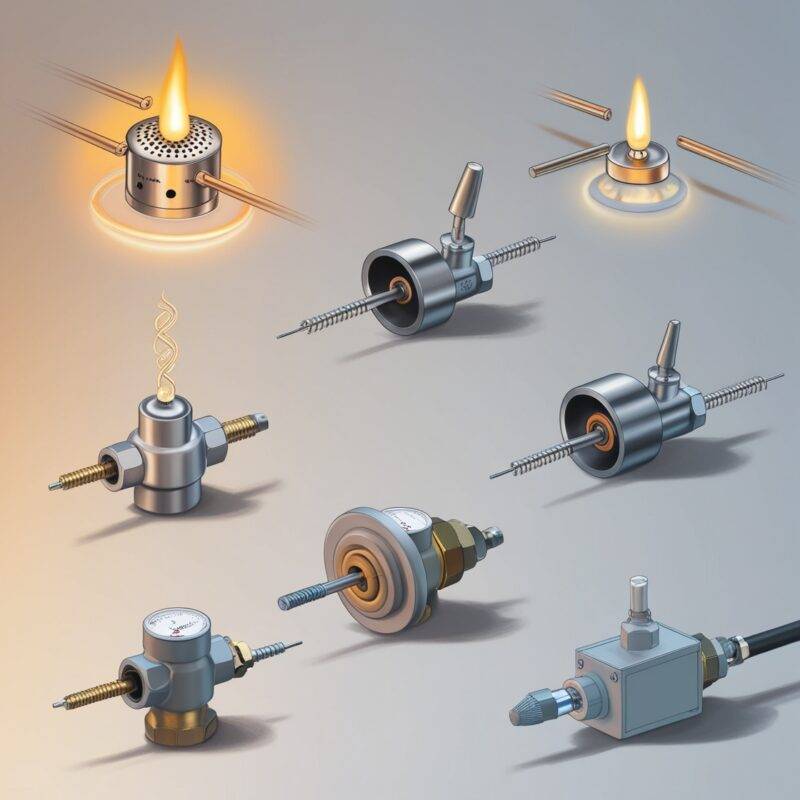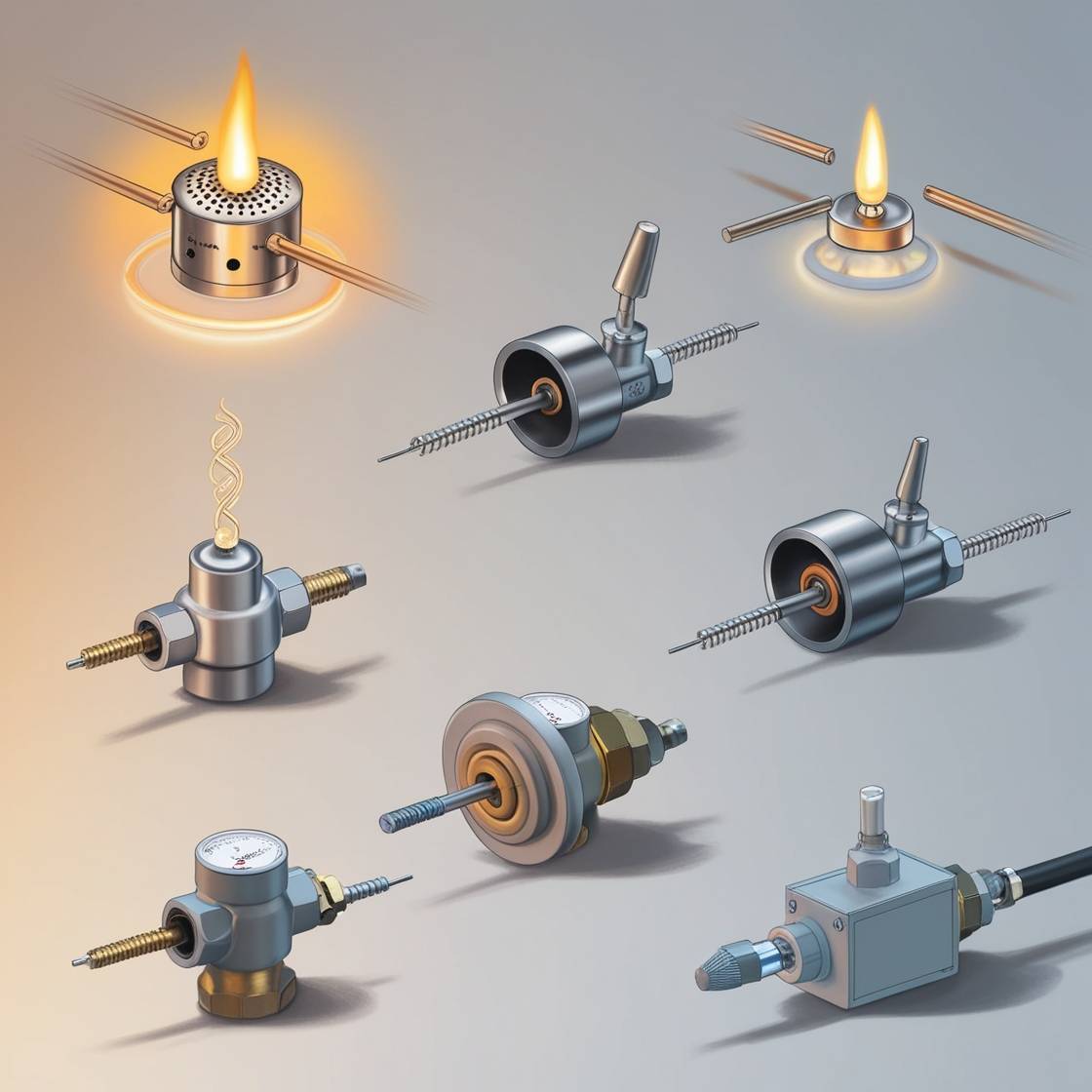Gas appliances are essential for cooking and heating, making them necessary for most households. However, gas appliances can experience various problems. Here are some common issues related to appliance malfunctions. This guide will discuss how to troubleshoot common gas appliance problems to help you keep your appliances functioning correctly.
Understanding your Gas Appliances
To diagnose, you must know the general functioning of gas appliances. This knowledge will enable one to gain insight into the components and mechanisms and, therefore, better diagnose a problem.
Gas Flow and Combustion
Gas appliances operate on a simple principle: gas flow and combustion. Natural gas or propane is supplied to valves, and when turned on, the gas ignites and burns to produce heat. Whether it is a stove, water heater, or furnace, this combustion process is fundamental for operating gas appliances.
Critical Components of Gas Appliances
Here are the primary components you’ll need to be familiar with:
Burners: Where the gas is burnt to generate heat.
Igniters/Pilot Lights: It is responsible for lighting the gas.
Thermocouples: Automatic devices that can guarantee that the pilot light is on and can turn off the gas when it is not.
Gas Valves: regulate the supply of gas to the device. Thermostats control the temperature in gas heaters and ovens.

Common Gas Appliance Problems
After learning the working process of these appliances, it is time to proceed directly to defects and their fixes. The following are the main issues mentioned, as well as their causes and relevant solutions.
The Pilot Light Won’t Stay Lit
A pilot light that turns off and, therefore, needs reigniting frequently will often be a problem for the owners of gas appliances, including stoves, furnaces, and water heaters.
Troubleshoot Common Gas Appliance Problems: Dirty or Misaligned Thermocouple
A thermocouple is a safety device mainly used for flame detection and control of the gas supply. It usually goes off if the electrode space is dirty or misaligned in any manner or if the space between the electrode and the pilot light is sweltering. To fix it:
- Turn off the gas.
- Use sandpaper or a brush and clean the thermocouple thoroughly.
- Check carefully about the flame that the thermocouple is in the upright position.
Faulty Gas Valve
If cleaning does not solve the problem, a problem with the gas valve that regulates the gas flow to the pilot light may be the cause. In this case, you are advised to replace it or seek the help of a technician.
Air in Gas Lines
In other instances, the pilot light will not stay lit because air has built up in the gas pathways. This is even more likely if the appliance has not been used for quite a long time. This may be corrected by venting or bleeding the air off the lines or cycling the appliance on and off.
Burner Won’t Ignite
Reading this article might help you realize that the following problems could cause your gas stove, heater, or water heater burner not to light.
Clogged Burner Ports
Grease, food particles, or soot may accumulate over the ports of the burner to the fights where it cannot let free flow of the gas. To fix this:
Twist off the burner cap, and you should be able to clean some of the ports with a wire brush or a sewing needle.
Igniter Issues
Cooker gas appliances, for instance, use an electric igniter to ignite the burner. The igniter may be impaired if the clicking is heard, but the burner does not light. This is often the answer: the igniter must be replaced.
Faulty Spark Electrode
It may be that the spark electrode that ignites the burner is somehow damaged. If so, it will require replacement. If this is the case, it will need to be changed. You can do this by seeing whether there is any visible spark that may show when you attempt to ignite the burner.
Troubleshoot Common Gas Appliance Problems: Weak Flame or No Flame at All
Common symptoms, such as your appliance only giving a weak flame or no flame at all, could be due to several causes.
Low Gas Pressure
This is because low gas pressure means that there will not be enough energy produced to fuel the flame. It is also essential to talk to your gas supplier to determine if there is a problem with the gas supply. Also, ensure that the gas supply is not blocked in the supply line or that there is no sign of leakage within the supply line.
Clogged Air Intake or Vents
Using gas appliances requires the right proportions of gas and air to burn to produce heat. The flame can be poor or nonexistent without a good air intake or vent, enduring the stove or fire. Make sure that the venting is visible and clean the intake.
Faulty Regulator
The gas regulator is the current controlling device to which gases are provided, ensuring delivery to the appliance. If it is defective, there may be a lack of free passage of the gas to the burner, leading to a small flame. Regulators usually must be replaced by a professional.
Gas Smell or Leaks
The gas smell is a big deal and should not be overlooked. Fires and explosions are always catastrophic since fuel gas leaks cannot be taken lightly.
Emergency Steps
If you detect a gas smell:
- Open the windows instantly to let fresh air in and avoid pollution from the already-infected air.
- Shut off the utility supply if possible.
- Evacuate the area.
- Contact your gas supply company or emergency service as soon as possible.
Checking for Leaks
If you smell gas faintly, you might test for leaks using water mixed with soap on the connections. If bubbles are present, that is some leakage. Nonetheless, always seek professional help when there is severe damage or you feel unsafe.
Gas Oven Isn’t Heating Properly
If your gas oven has failed to heat or does not seem to heat evenly, there could be several reasons for this.
Faulty Igniter
If the oven does not heat at all, it might be a problem with the igniter. You can check by turning on the igniter and observing if it glows. If this is the case, replacing it with a new one is worth replacing to avoid causing more complications. Acupuncture stimulates many points of the body.
Thermostat Issues
If the oven warms but does not get as hot as desired, the problem could be with the thermostat. Hence, you might need a technician to set up or inspect the thermostat when required.
Burner Blockages
Again, the burner ports must be blocked to prevent uneven heating, especially in gas ovens. The collector tray filled with debris and burner soot should help rectify the problem.
Water Heater Not Producing Hot Water
Gas water heaters are yet another appliance you will likely encounter with some of these woes. Here’s how to address them.
Pilot Light Out
You must check the pilot light to see if your water heater does not produce hot water. We see it as out; rekindling it may make it.
Faulty Thermocouple
A lousy thermocouple can cause the pilot light to go off and not light up again. You may want to try cleaning or replacing the thermocouple, which should restore your water heater’s functionality.
Sediment Build-Up in Tank
Sediment can and will build up in the bottom of the water heater tank, causing the heater to become less efficient. Since the problem arises from sediment buildup, the only way to tackle it is to drain and flush the tank so that hot water can be provided again.
Gas Dryer Not Heating
Another appliance that is sometimes faced with heating issues is gas dryers.
Igniter Failure
The igniter in a gas dryer warms the air. This is a dryer igniter; the device will not provide any heat if the area is terrible. If it’s faulty, you can only test and replace it when necessary.
Faulty Thermal Fuse
If your dryer is not heating, the problem could be caused by a blown thermal fuse. This small fuse overheats; if it is faulty, it must be replaced.
Clogged Venting
A vent could be blocked, hampering its ability to allow fresh air into a room or regulate temperature. One sign is blockage. Ensure the vent is clean to enhance dryer performance.
Strange Noises from Gas Appliances
Any noise comparable to banging, hissing, or clunking should not be coming from your gas appliances, and it could mean a lot of trouble.
Hissing Noise
A hissing noise is most often associated with gas leakage. If you experience this problem, switch off the appliance and contact a technician.
Banging or Popping Sounds
Such noises in gas or water heaters commonly suggest that deposits have accumulated in the device. Cleaning or flushing the system can solve the problem.
Clicking Noise
If a gas stove sporadically clicks, it might be caused by the igniter, or an oven might need a new igniter. If the igniter is off position or defective, it continues to attempt to ignite. As stated above, this should be solved by replacing or adjusting the igniter.
Preventative Maintenance for Gas Appliances
Common causes of gas appliance problems are usually averted by routine maintenance.
Regular Cleaning
Ensure the system burners, vents, and other related pieces are clear; otherwise, they will likely be blocked. A monthly cleaning will help ensure that the appliances are always efficient.
Annual Inspections
Professional inspections should be done at least once per year as part of regular car maintenance to identify other minor problems that have yet to emerge. This is especially true for most primary household uses, such as water heaters and furnaces.
When to Call a Professional
Here are certain circumstances in which avoiding risk and calling a professional is advisable.
Complex Repairs
These problems include wiring, significant parts such as gas valves, or electronic failures. If you can identify the electronic shortcomings, it is advisable to call a technician.
Gas Leaks
You should always hire a licensed technician to fix any gas leakage. They have all the equipment and skills to address the problem safely.
Conclusion
The home gets an easy way of preparing food through a gas appliance, but they sometimes need a technician in a repair plan. Whenever you are faced with a problem such as a burned-up burner or a more complicated one like gas leakage, you will know how to handle it, saving you time and money. Always remember: in doubt, Call a professional 😉😊.
FAQs
Why does my gas stove click but won’t ignite?
The fire igniter might be in bad condition or have dirt accumulated on the system. Unless it is beyond cleaning, it should be washed; the product should be changed if that is not possible. Read more.
How do I know I am having a gas leakage problem?
You should know when you can sense the presence of gas around you or hear a hissing sound, which is a sign of a leakage. In all situations, evacuate first and dial for assistance second.
Which factors lead to the formation of weak flames in the gas appliances?
Low gas pressure, blocked air vents, or a faulty regulator can cause weak flame.



